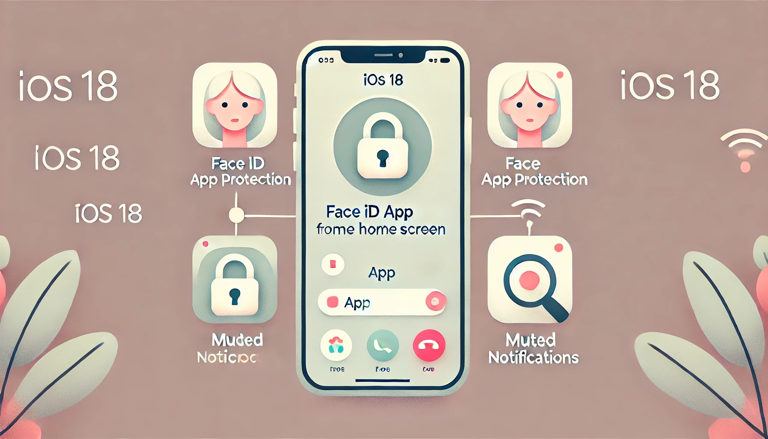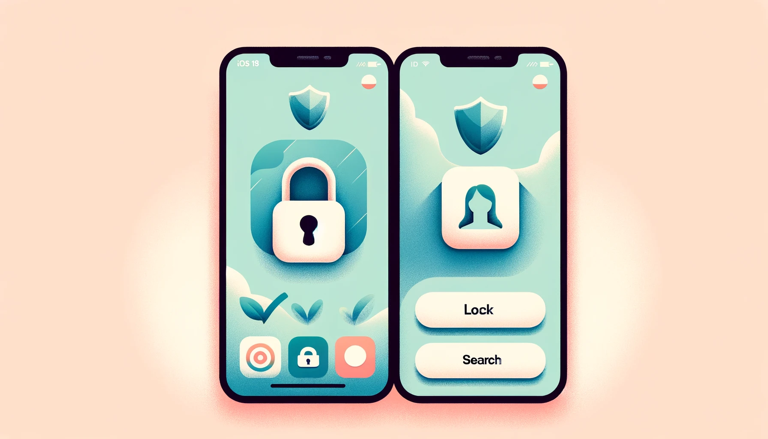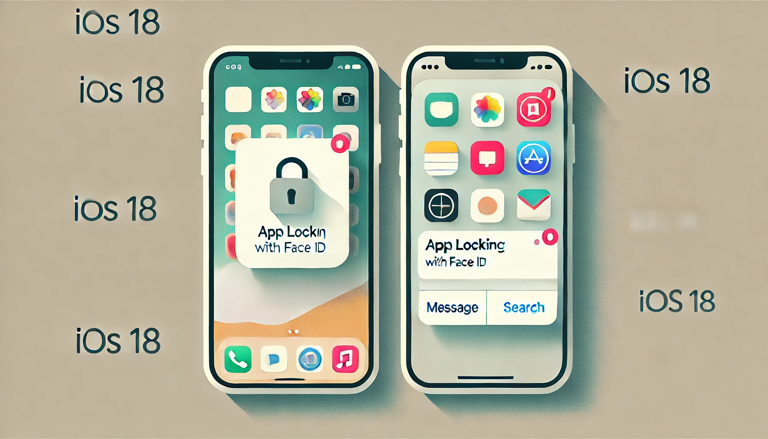With the release of iOS 18, social media has been buzzing with claims that Apple’s new features—like locked and hidden apps—make the iPhone the ultimate tool for cheaters. This misinformation started circulating shortly after iOS 18 was unveiled at the WWDC in June and has resurfaced since the official public release. Influencers on TikTok, X (formerly Twitter), and other platforms have labeled iOS 18 as a "cheater's paradise" due to its app locking and hiding functions. However, these accusations are sensationalized, based on misunderstandings, and often ignore the real benefits of these features.

What Are Locked and Hidden Apps?
iOS 18 introduces the ability to lock apps with Face ID, requiring biometric authentication to access certain apps even when the phone is unlocked. This ensures that only the device owner can open these apps, preventing unauthorized access. The hidden apps feature goes a step further, allowing users to completely remove certain apps from their home screen and search results. Notifications from hidden apps are muted, and the apps become almost invisible, with only minimal references left in settings.
These features are not unique to Apple. Android devices have had similar capabilities for years. Yet, influencers on platforms like TikTok quickly painted a picture of these tools as being tailor-made for cheaters. Claims have spread that hidden apps could be used to conceal dating profiles on Tinder or Bumble, or that locked apps could help hide secret conversations. These unfounded hot takes have fueled a wave of online hysteria, with users suggesting that these features spell the end of trust in relationships.
The Reality Behind App Locking and Hiding
The truth is much more nuanced. Apple didn’t design these features with cheaters in mind, and these claims overlook the many legitimate reasons a person might want to lock or hide apps.
For instance, privacy concerns are a major motivation. A user may want to protect sensitive work apps, banking information, or personal messages from prying eyes. Parents could use app locking to ensure that their children don’t accidentally access professional or inappropriate content while using the family iPhone. Hidden apps can also be a valuable tool for people who need to safeguard their privacy in delicate situations, such as LGBTQ+ individuals who have not yet come out to their families or activists operating under oppressive regimes. In these cases, being able to discreetly hide certain apps or communications could be a matter of personal safety.

Even in more mundane scenarios, such as preventing friends from snooping or using your phone for amusement, these features are helpful. It’s easy to imagine someone wanting to keep a dating app hidden to avoid being teased by their friends, or locking social media apps to keep their profiles private during a phone handover.
The Misinformation Machine: TikTok’s Role
The viral nature of TikTok has fueled these misconceptions. Many TikTok influencers have made exaggerated claims, stating that iOS 18 allows users to automatically lock and hide apps if the wrong face is detected or that Apple is purposefully enabling infidelity. Some even suggest that Apple has wasted resources developing these features instead of focusing on hardware improvements, such as a better front-facing camera.
These rumors show a fundamental misunderstanding of how Apple operates. Apple’s software and hardware teams are not a single entity—different departments focus on different priorities. Developing app locking and hiding features doesn’t come at the expense of camera upgrades or other hardware enhancements. Yet, for TikTok influencers, quick, sensationalized content often drives views and engagement, regardless of the accuracy of the claims being made.
A Feature That Already Exists on Android
The irony of these accusations is that Android devices have offered similar functionality for years. The ability to hide apps or protect them with additional authentication isn’t new to mobile operating systems. In fact, Android’s version of these features predates iOS 18 by several years, yet Android has not been the target of the same kind of scrutiny. The cheater narrative seems more like a convenient excuse to generate clicks and controversy rather than a reflection of Apple’s actual intentions.
Cheating Isn’t About the Technology
At the end of the day, cheating is about people, not the technology they use. There have always been ways to hide infidelity, long before smartphones existed. Whether it was secret phone calls, hidden letters, or other forms of discreet communication, cheaters have always found ways to cover their tracks. Technology may change, but human behavior doesn’t.
Interestingly, Apple was even the target of a lawsuit by a man who claimed that his iPhone betrayed him. In June, a British man threatened to sue Apple after his wife discovered incriminating messages he had sent to escorts. Even though he deleted the texts from his iPhone, they were still visible on the family iMac through iCloud syncing, ultimately leading to his divorce and the loss of millions of pounds in the settlement.

The lesson here is that no amount of technology will save someone from the consequences of unfaithful actions. If someone wants to cheat, they will find a way to do so, regardless of whether they use iOS, Android, or even an old flip phone.
iOS 18: Privacy-First Design
What’s often missing from these heated social media debates is a recognition of Apple’s commitment to privacy. Apple has long positioned itself as a privacy-first company, with iOS 18 being no exception. The app locking and hiding features are just the latest in a long line of tools designed to protect users from unauthorized access, snooping, or data breaches.
Ultimately, the app locking and hiding functions in iOS 18 are about giving users more control over their personal information. Whether it’s protecting sensitive work data, safeguarding private communications, or preventing children from accessing restricted apps, the features offer more flexibility for managing privacy on an individual level.
Conclusion: The Bigger Picture
The outcry over iOS 18’s new features is overblown and largely unfounded. These tools have far more legitimate uses than nefarious ones, and the claim that Apple is somehow encouraging cheating by offering them is simply untrue. Influencers on platforms like TikTok may perpetuate these myths for views and engagement, but the reality is much less dramatic.
App locking and hiding features are about privacy and user control—principles that have always been at the core of Apple’s design philosophy. Instead of focusing on the small minority who might misuse these tools, it’s worth recognizing the broader benefits they provide in safeguarding personal data and protecting vulnerable users. Just like any tool, its value depends on how it’s used. Cheaters will always find a way, but for the vast majority of iPhone users, iOS 18’s privacy enhancements will make their digital lives safer and more secure.